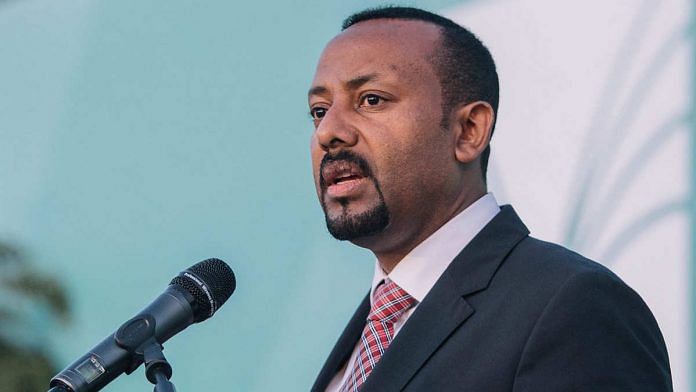Protests took place in Oromia region
Less than a month after Ethiopia’s Prime Minister Abiy Ahmed was awarded the Nobel Peace Prize, his country has descended into chaos and violence. Protests in the country’s Oromia region against the treatment of a prominent activist turned into raging sectarian violence, leading to the killing of 78 people and 409 arrests last week.
Ahmed was recognised for his “efforts to achieve peace and international cooperation, and in particular his decisive initiative to resolve the border conflict with neighbouring Eritrea”, which is a long-time enemy.
But in a deeply ethnically-divided Ethiopia, this had some dire consequences as well.
Though there is freedom for people to protests, the country does not have the tools or the capacity to meaningfully engage with the protesters. In such a scenario, Ahmed used iron-fist to quell the protests and observers feel that he risks going down the authoritarian path.
Ethiopia’s ethnic divisions
Ethiopia has over 80 ethnic groups. For administrative purposes, the country was divided into nine ethnically-constituted regions — representing the nine largest ethnic communities.
Oromia, where the violence has taken place, is one of the nine ethnic regions. It is home to about 35 million Oromo — constituting nearly a third of the country’s 105 million population.
“The Oromo led the protests against the previous government of the Ethiopian People’s Revolutionary Democratic Front, a four-party coalition that has ruled Ethiopia (in some senses, very successfully) since overthrowing a Marxist dictatorship in 1991,” writes Financial Times’ Africa Editor, David Pilling.
“But, after a quarter of a century in power, EPRDF rule became untenable. Street protests, beginning in around 2015 in Oromia and spreading to Amhara, the second most populous region, eventually toppled the old leadership. That cleared the path for Mr Abiy to become party head and prime minister, the country’s first Oromo leader in more than 2,000 years,” adds Pilling.
The key reason behind the Oromo protests was that the EPRDF was being dominated by another ethnic group, the Tigraynas, who had led the guerrilla insurgency against the older Marxist regime. The Tigraynas dominated the top political and economic decision-making.
More importantly, under the rule of Tigrayanas, Ethiopia saw massive economic development, but under authoritarian rule. There was hardly any political freedom or free press. And the Tigrayanas had the final say over how the country’s resources would be used.
Cost of Ahmed’s political liberalisation
Following nearly three decades of authoritarian rule, once Ahmed came to power in 2018, he decided to enforce large-sale political reforms. Political parties were allowed, free press could exist and political prisoners were freed.
But this political opening up came at a cost.
“As political space has opened and EPRDF control has weakened all sorts of latent disputes over power, resources, identity and territory have surfaced,” William Davidson of the CRISIS Group told the Financial Times.
As a consequence, centuries-old ethnic divisions are now playing out in the open. Moreover, in a country that manages to somehow hold so many diverse ethnic regions together, rising sub-nationalism can be detrimental for its future.
Pilling writes that people fear that in order to deal with such sub-nationalism, Ahmed may resort to authoritarian means.
“Mr Abiy is still preaching the philosophy of medemer, an Amharic word meaning strength through diversity. It is a noble sentiment. But last week, protesters in yet another part of the country were burning his book by the same name,” he says.



